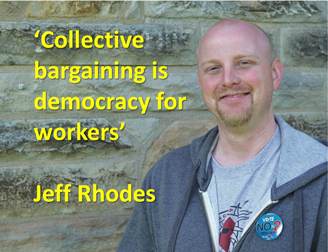Debate is good—it often yields innovation. Debate is the cornerstone of an educated modern society. Collective bargaining is just that—a debate. Collective bargaining allows educators to have a discussion about what we need to help ensure that our students are prepared to succeed.
And what happens in a debate? Both sides come to a table, sit down and present their arguments. In the end, each side gets a little of what they want, neither side controls the procedure, but both sides get a voice in the outcome. That is truly what happens in collective bargaining.
Unions don’t come to the table and receive all that they want. Countless hours are spent debating the merits of a particular contract provision. In the end, BOTH sides agree to terms. But the process doesn’t stop there either. Contracts are then voted on by BOTH sides. Sometimes these contracts go in front of mayors, city councils and school boards for approval. Collectively, we get a chance to voice our opinions in the process.
I’m entering my ninth year of teaching. Technical education is considered a “special subject,” so my program falls outside the provisions of our local union contract—meaning it could be cut at any time. Even though I’m not directly impacted by collective bargaining, I know it’s wrong to strip the collective bargaining rights of teachers and other educators.
Collective bargaining is democracy for the workers. Taking away that right is wrong. It’s the reason Issue 2 is unfair, and why I’m voting against it.
—Jeff Rhodes, technical education teacher, North Royalton

